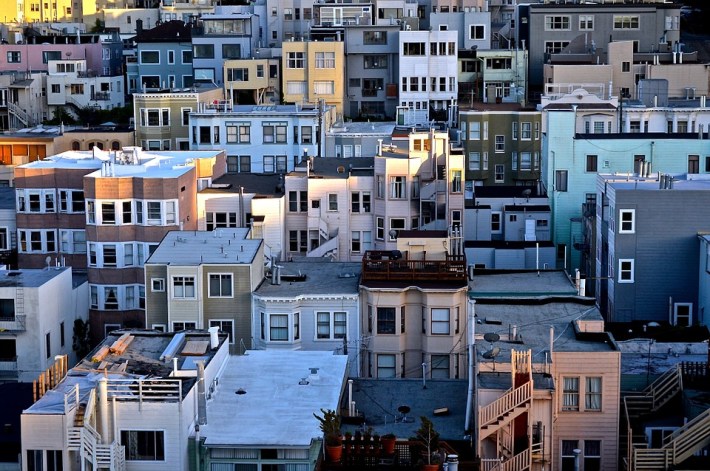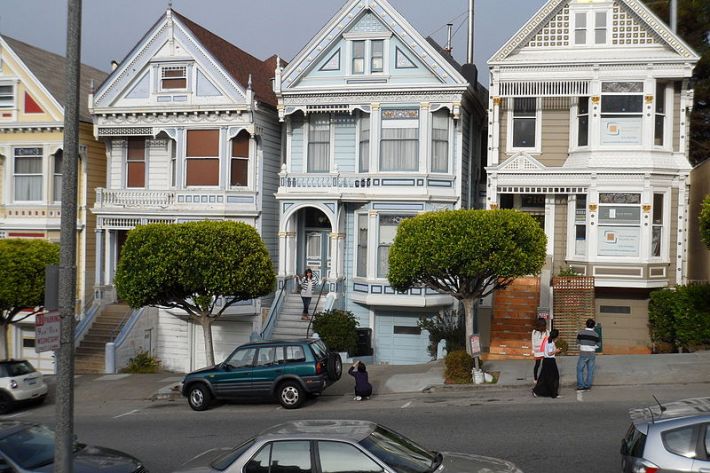
There seem to be two points of view on San Francisco's frustrating housing situation: either the tech industry is to blame for increasing demand or it comes down to NIMBY homeowners hoarding housing stock and preventing new development. Or maybe it's some combination of the two?
Clearly, there's a desire to keep San Francisco looking like San Francisco; nobody wants to tear down Painted Ladies and build high rise condos in their place. And there's room for the condo towers elsewhere. But what if there were a way to create 33,000 new housing units in San Francisco, quickly, without any heavy construction or changes to neighborhood aesthetics?
In-Law units, also known as "Accessory Dwelling Units" (ADU) aren't necessarily the most glamorous solution, but in a city with the median price of a one bedroom at $3500 per month, the highest rent in the nation, maybe it's time to let the market add inventory--even if it includes garage and basement apartments.
Currently, ADUs are permitted only in District 3 and District 8. So Supervisor Aaron Peskin has a simple proposal: if someone has a house with a shed, or a garage, anywhere in the city, and they're willing to add windows, doors, and whatever else they need to get that extra space up to code, then let them turn it into an apartment. “This legislation is intended to spread density more equitably throughout the city and has the potential to create upwards of 33,000 new permanently affordable units, based on the city’s own projections,” said Peskin, in a prepared statement.
"We are not creating new construction or subdividing an existing address--we are only creating new opportunities for housing within the existing space," explained Sunny Angulo, Legislative Aide to Peskin. "Examples would be a shack in the backyard, a garage or a basement unit that could become a dwelling with the addition of windows."
According to the 2010 Census, San Francisco is already the most densely populated city in California and the Bay Area is the second most densely populated urban area in the US, after New York City. That density, if properly managed, can be a great thing for encouraging a more walk and bike-friendly lifestyle. “Supervisor Peskin’s legislation aligns with SPUR’s agenda to address the housing affordability crisis in San Francisco,” said Gabe Metcalf, Executive Director of SPUR, the San Francisco Bay Area Planning and Urban Research Association. “The legislation will add and preserve affordable housing supply to a desperate market.”

The proposal bans the new units from being used for Airbnb. Additionally, they will fall under rent control--so once someone moves in, city regulations on increases will kick in. "Housing costs have skyrocketed, which have led San Francisco to be the most expensive city to live in the nation," according to the announcement from Peskin's office. "Housing costs in San Francisco are beyond the reach of the vast majority low- and middle-income households. Approximately 90 percent of individuals earning less than $35,000 and over 50 percent of individuals making from $35,000 to $75,000 are spending more than 30 percent of income on rent."
A couple of days ago, Streetsblog did a story about the expected re-use of garage and parking spaces brought on by ride-hail services which, presumably, will reduce the number of private cars that sit idle 95 percent of the time. If that's going to be realized, it must be accompanied by an opening up of ADUs. And, according to Peskin's deputy, that's exactly what they're thinking.
"This is an impressive proposal to expand the supply of rent control housing through secondary units across the city, and it is good to see specific controls to ensure long-term affordability to serve the needs of low income and middle income residents,” said Peter Cohen, co-directors of San Francisco’s Council of Community Housing Organizations.
Peskin's ordinance just got put out there this week, so time will tell if the other supervisors will sign on and how far the idea of a citywide ordinance will get. But it's an idea that's been growing in popularity--at the state level too--as the region struggles to find more housing.





